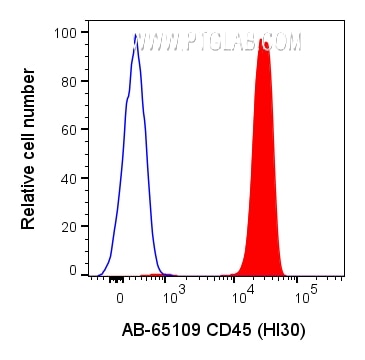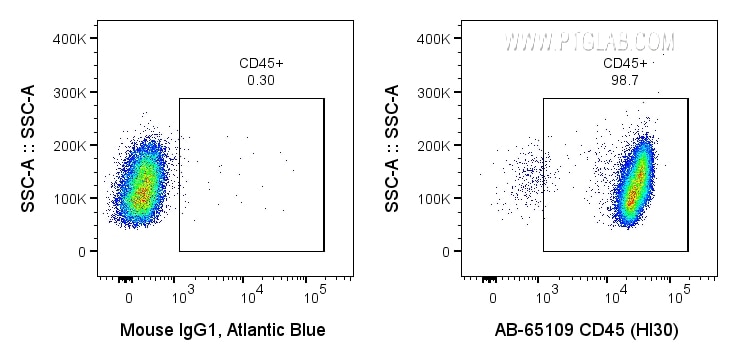Anticorps Monoclonal anti-CD45
CD45 Monoclonal Antibody for FC
Hôte / Isotype
Mouse / IgG1, kappa
Réactivité testée
Humain
Applications
FC
Conjugaison
Atlantic Blue™ Fluorescent Dye
CloneNo.
HI30
N° de cat : AB-65109
Synonymes
Galerie de données de validation
Applications testées
| Résultats positifs en cytométrie | CMSP humaines, |
Dilution recommandée
| Application | Dilution |
|---|---|
| This reagent has been pre-titrated and tested for flow cytometric analysis. The suggested use of this reagent is 5 µl per 10^6 cells in a 100 µl suspension or 5 µl per 100 µl of whole blood. | |
| Sample-dependent, check data in validation data gallery | |
Informations sur le produit
AB-65109 cible CD45 dans les applications de FC et montre une réactivité avec des échantillons Humain
| Réactivité | Humain |
| Hôte / Isotype | Mouse / IgG1, kappa |
| Clonalité | Monoclonal |
| Type | Anticorps |
| Immunogène | Human peripheral blood leucocytes |
| Nom complet | protein tyrosine phosphatase, receptor type, C |
| Numéro d’acquisition GenBank | BC014239 |
| Symbole du gène | CD45 |
| Identification du gène (NCBI) | 5788 |
| Conjugaison | Atlantic Blue™ Fluorescent Dye |
| Excitation/Emission maxima wavelengths | 404 nm / 458 nm |
| Forme | Liquide |
| Méthode de purification | Purification par affinité |
| Tampon de stockage | PBS with 0.09% sodium azide and 0.5% BSA |
| Conditions de stockage | Store at 2-8°C. Avoid exposure to light. Stable for one year after shipment. |
Informations générales
CD45, also known as protein tyrosine phosphatase, receptor type C, is a type I transmembrane protein expressed on the surface of all haematopoietic cells with the exception of erythrocytes and platelets (PMID: 3489673; 28615666). CD45 is a pan-haematopoietic cell marker and has been shown to be essential for T- and B-cell activation and signalling (PMID: 9429890; 16378097).
Protocole
| Product Specific Protocols | |
|---|---|
| FC protocol for Atlantic Blue™ CD45 antibody AB-65109 | Download protocol |
| Standard Protocols | |
|---|---|
| Click here to view our Standard Protocols |



